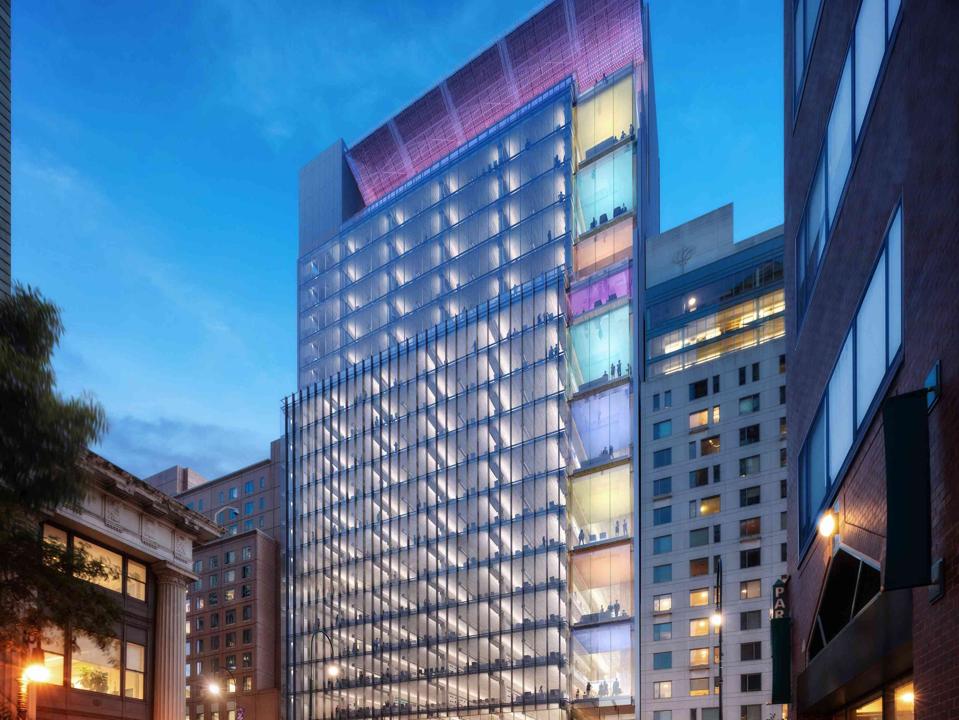Might the flexibility and adaptability of brand new office buildings, such as Zero Irving in New … [+]
Davis Brody Bond
Lockdowns are ending and Americans are slowly returning to their old workday haunts, aka their offices. It’d be great if they were doing so with the peace of mind the deadly virus is behind us. Sadly, as we’re constantly told, COVID-19 is still “out there.” The need to return to the office while sidestepping exposure is sparking all kinds of debate. Issues include how to prepare offices for workers’ safe return, whether brand new buildings will prove safer than old ones and even whether there exist ideal settings to dodge COVID-19.
Questions about how to prepare workplaces for an influx of germaphobes led design firm Nelson Worldwide to compile a tip sheet with guidelines fostering a safe and motivating workplace setting. The ground rules include a number of notable line items. To mitigate germs, use disposable flat wear and eating utensils and temporarily outlaw reusable cups and utensils. Minimize contact with communal settings like conference rooms and gathering areas and their tables and chairs by urging stand-up meetings. Give workers physical protection between work stations by installing clear panels or sneeze guards.
Re-entry software
With workers re-entering their old offices, changing guidelines and evolving practices of the type cited above are challenging the ability of commercial property owners/operators to handle everything at once. Building operations software providers are responding.
Among them is Building Engines, which is giving free access to critical building operations software to help CRE pros deal with COVID-19 response. Building Engines is offering three simplified software modules preconfigured to buttress property reopening salvos during the pandemic. This new release provides rapid access for those property teams without in-place operations software or software that can address COVID-19 use cases.
The first of the modules focuses on work orders, providing a fixed set of issue types related to possible demands resulting from the pandemic. This module enables operators to start work more expeditiously, and lets tenants submit orders from preferred devices.
The second module drills down into building communications, addressing owners’ and operators’ need for ongoing communication with tenants, and the fact emergency-specific communication protocols and safety guideline notifications are now even more a must.
The third module zooms in on inspections, which increasingly will be undertaken to learn whether masks are being worn, hand-sanitizing stations refilled, and high-touch surfaces cleaned. This module provides COVID-19 and cleaning-demand related templates that will become increasingly essential in an era of critical attention to disinfecting.
New and old
Just when you thought you had heard every aspect of the pandemic discussed, a fresh debate has emerged around the issue of new versus old buildings. In Manhattan, most office space exists in buildings more than a half-century old. That’s spurred the question of not just whether landlords can adapt, but whether the underlying structures themselves are adaptable enough, and whether brand new buildings might enjoy an advantage in being more pliant and malleable.
Arguing new buildings do have a leg up are officials of RAL Development Companies, designer and developer of the under-construction Manhattan office building Zero Irving. Ground had been broken and work begun on the structure before the health crisis unfolded. But as they considered their new building, members of the development team recognized it likely would benefit from a distinct flexibility and nimbleness older buildings lack. That might make it a preferred office setting for employers seeking to keep their workers safe.
“We understand that tenants will have very different needs depending on how they decide to move forward in this new reality,” says Josh Wein, managing director with RAL, noting the building will cater to both emerging tech firms and long-established legacy companies. “Zero Irving is in a way privileged. It is uniquely positioned to cater to tenants regardless of how they want to set up their space and tackle office life post COVID-19.”
